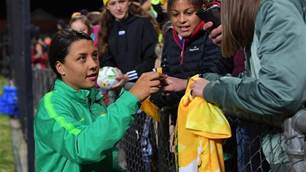In its previous incarnations, the prize of being called the best football club in the world was one which was fought for passionately by players who would sometimes stop at nothing to finish on the winning side.
The team perhaps most synonymous with the battle for global supremacy remains the Buenos Aires based Estudiantes, who contested three consecutive finals in the late 1960s and left chaos and controversy trailing in their wake.
Estudiantes won the home leg of their 1968 Intercontinental Cup final against Manchester United 1-0, after which United goalkeeper Alex Stepney remarked: "The Estudiantes players are dirty, like animals."
The venerable Sunday Times correspondent Brian Glanville went further, commenting in the newspaper: "Some of their tactics.. drew us to question how football at the highest level can survive as a sport."
The Argentinians survived a hostile atmosphere at Old Trafford to draw 1-1 in the second leg and take the title, but the following year they would not be so fortunate, losing their first leg 3-0 to Milan in Italy.
The Estudiantes players were seething by the time of the largely irrelevant second leg a short time later, and they took their frustrations out on their opponents, one of whom was left with a fractured cheekbone.
Such was their display of thuggery Argentinian president Juan Carlos Ongania ordered the entire team to be arrested with three team members, including goalkeeper Alberto Poletti, ultimately sent to prison and banned for life.
While it may be considered with some relief that such days of uncontrollable aggression are long gone, there will be many who wish for a return to the times when what ought to be the biggest club event on the calendar ignited such passion.
Instead, the two-legged tournament limped on until 1979, with numerous European champions, including Ajax, Liverpool and Nottingham Forest, declining to play, and the 1975 final being scrapped because Bayern Munich and Independiente could not agree on suitable dates.
It was not exactly what FIFA officials had had in mind in 1960 when they inaugurated the global competition for the first time as a natural extension of the brand new Copa Libertadores, designed to crown a continental champion in South America for the first time.
Real Madrid were the first winners, hammering Uruguayans Penarol 5-1 in the second leg after a goalless draw in the first leg, although Penarol claimed the title the following year with a crushing 7-1 aggregate win over Benfica.
The ailing and uninteresting two-legged format was finally abandoned ahead of the 1980 final, after sponsorship of the competition by Toyota on the understanding the match be moved to a one-off event in Japan.
The move only served to alienate supporters from the event even more, but at least it made more financial sense for the participating clubs, who could hardly be blamed for using it as little more than a lucrative summer leg-stretch.
For the South Americans, the extra incentive of seeking to impress rich European opponents was obvious, and borne out in the first five neutral tournaments, all of which were won by clubs from across the Atlantic.
Porto were the last winners of the Intercontinental Cup on penalties over Colombian side Once Caldas in 2004, an achievement which earned them little more than a place on a Trivial Pursuits answer card for ever more.
By that time, FIFA had already tentatively sought to establish a parallel Club World Championship with near-disastrous results, their first event, in Brazil in 2000, marred by accusations of an apparently rather random selection of teams.
These included Manchester United who, although deserving their slot as reigning European champions, insisted they would only compete if the Football Association agreed to them sitting out of the 2000 FA Cup.
Corinthians went on to beat fellow Brazilians Vasco de Gama on penalties after a goalless draw to end a thoroughly underwhelming competition, and planned repeats in 2001 and 2003 both fell through.
The competition was only re-launched successfully after an agreement to merge with the Intercontinental Cup, the result being a six-team tournament between the reigning continental champions, with the final in Yokohama in 2005.
Manchester United will once again provide the Barclays Premier League representatives in this year's tournament in Japan, along with LDU Quito of Ecuador, Mexico's Pachuca, Gamba Osaka from the J-League, Al-Ahly of Egypt, New Zealand's Waitakere United and Australia's Adelaide United.
But the signs are still of a tournament struggling for justification in today's crowded fixture calendar. And perhaps requiring a repeat dose of its earlier controversies to give it the kick up the backside it needs.
Estudiantes won the home leg of their 1968 Intercontinental Cup final against Manchester United 1-0, after which United goalkeeper Alex Stepney remarked: "The Estudiantes players are dirty, like animals."
The venerable Sunday Times correspondent Brian Glanville went further, commenting in the newspaper: "Some of their tactics.. drew us to question how football at the highest level can survive as a sport."
The Argentinians survived a hostile atmosphere at Old Trafford to draw 1-1 in the second leg and take the title, but the following year they would not be so fortunate, losing their first leg 3-0 to Milan in Italy.
The Estudiantes players were seething by the time of the largely irrelevant second leg a short time later, and they took their frustrations out on their opponents, one of whom was left with a fractured cheekbone.
Such was their display of thuggery Argentinian president Juan Carlos Ongania ordered the entire team to be arrested with three team members, including goalkeeper Alberto Poletti, ultimately sent to prison and banned for life.
While it may be considered with some relief that such days of uncontrollable aggression are long gone, there will be many who wish for a return to the times when what ought to be the biggest club event on the calendar ignited such passion.
Instead, the two-legged tournament limped on until 1979, with numerous European champions, including Ajax, Liverpool and Nottingham Forest, declining to play, and the 1975 final being scrapped because Bayern Munich and Independiente could not agree on suitable dates.
It was not exactly what FIFA officials had had in mind in 1960 when they inaugurated the global competition for the first time as a natural extension of the brand new Copa Libertadores, designed to crown a continental champion in South America for the first time.
Real Madrid were the first winners, hammering Uruguayans Penarol 5-1 in the second leg after a goalless draw in the first leg, although Penarol claimed the title the following year with a crushing 7-1 aggregate win over Benfica.
The ailing and uninteresting two-legged format was finally abandoned ahead of the 1980 final, after sponsorship of the competition by Toyota on the understanding the match be moved to a one-off event in Japan.
The move only served to alienate supporters from the event even more, but at least it made more financial sense for the participating clubs, who could hardly be blamed for using it as little more than a lucrative summer leg-stretch.
For the South Americans, the extra incentive of seeking to impress rich European opponents was obvious, and borne out in the first five neutral tournaments, all of which were won by clubs from across the Atlantic.
Porto were the last winners of the Intercontinental Cup on penalties over Colombian side Once Caldas in 2004, an achievement which earned them little more than a place on a Trivial Pursuits answer card for ever more.
By that time, FIFA had already tentatively sought to establish a parallel Club World Championship with near-disastrous results, their first event, in Brazil in 2000, marred by accusations of an apparently rather random selection of teams.
These included Manchester United who, although deserving their slot as reigning European champions, insisted they would only compete if the Football Association agreed to them sitting out of the 2000 FA Cup.
Corinthians went on to beat fellow Brazilians Vasco de Gama on penalties after a goalless draw to end a thoroughly underwhelming competition, and planned repeats in 2001 and 2003 both fell through.
The competition was only re-launched successfully after an agreement to merge with the Intercontinental Cup, the result being a six-team tournament between the reigning continental champions, with the final in Yokohama in 2005.
Manchester United will once again provide the Barclays Premier League representatives in this year's tournament in Japan, along with LDU Quito of Ecuador, Mexico's Pachuca, Gamba Osaka from the J-League, Al-Ahly of Egypt, New Zealand's Waitakere United and Australia's Adelaide United.
But the signs are still of a tournament struggling for justification in today's crowded fixture calendar. And perhaps requiring a repeat dose of its earlier controversies to give it the kick up the backside it needs.
Copyright (c) Press Association
Related Articles

Bayern's plan to fast-track teen star Irankunda into first team squad

The Best and Worst of Mariners vs Adelaide













